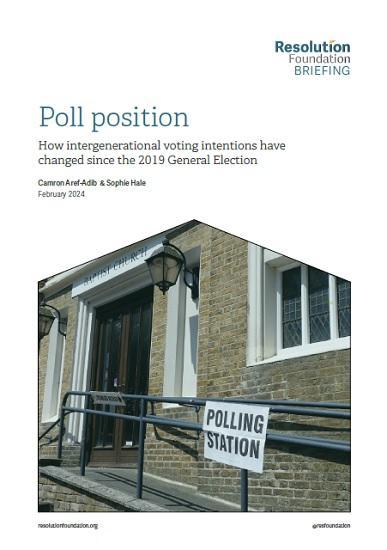Britain's Deepening Turnout Divide - Less Well-off Millennials Are Increasingly Unlikely To Vote Compared To Their Better-off Counterparts
11th February 2024

The turnout divide between richer and poorer young voters is deepening, with millennial non-graduates and non-homeowners increasingly unlikely to vote compared to their graduate and homeowning counterparts since the last general election, according to new Resolution Foundation analysis published Wednesday 7 February 2024.
The research examines the rising role of age in influencing people's political preferences ahead of the next election.
The authors note that age has replaced income as the main divide in British politics. In 1992, those aged over 70 were only slightly more likely (by 5 percentage points) to vote Conservative than Labour. By 2019, the over 70s were more than twice as likely to vote Conservative as those aged 30 (60 per cent versus 28 per cent). Young people's preference for Labour over the Conservatives is similarly stark.
But while Labour has seen a big swing up in the polls, the report notes that a significant cohort of millennials are bucking this trend.
Last year, millennial non-homeowners and non-graduates were the only cohorts across the whole UK population to not have become more likely to vote Labour since the last general election. For example, while homeowning millennials were 7 percentage points more likely to vote Labour in 2023 than 2019, non-homeowners were in fact 3 percentage points less likely to vote Labour.
However, this swing away from Labour does not mean that non-homeowning and non-graduate millennials have become more likely to vote Conservative. Instead, these groups have become more likely not to vote at all, widening the education and homeownership turnout gap among young people.
A significant turnout gap was already present in 2019, as almost 70 per cent of homeowning millennials reported voting in the general election, compared to less than half (41 per cent) of non-homeowning millennials.
But this turnout gap is likely to get even wider at the next general election. The share of non-homeowning millennials saying that they are likely to vote in the next election is down by 8 percentage points compared to 2019, while this share has increased slightly for homeowning millennials (by 2 percentage points). There is a similar widening of the gap between millennial graduates and non-graduates.
The Foundation notes that these groups tend to be less well-off than their homeowning and graduate counterparts. On average, homeowners and graduate millennials' household incomes (after housing costs) were 45 per cent and 44 per cent higher than their non-owning and non-graduate counterparts respectively in 2021.
The deepening turnout divide among the millennial generation will contribute to a wider long-term trend of declining political participation among younger cohorts in the UK. Between the 1964 and 1992 general elections, voter turnout was broadly similar between age groups, sitting at between 70 and 80 per cent. But since 1997, turnout for 25-34-year-olds has dropped considerably - to below 60 per cent - with the turnout gap between these voters and those aged 65 and over standing at 24 percentage points at the 2019 election.
This wider turnout gap between generations is likely to be sustained, at least in the short term, as baby boomers report being even more likely to vote in the next election than in 2019 - comprising 34 per cent of intended voters versus 28 per cent for millennials. This turnout advantage comes despite the boomer generation having shrunk since 2019 (from 34 per cent of eligible voters to 31 per cent) and now making up the same share of eligible voters as millennials.
The Foundation notes that these widening turnout gaps between old and young, and between poorer and richer millennials, are concerning because people who don't vote in the first election they are eligible for are less likely to vote in future elections.
Sophie Hale, Principal Economist at the Resolution Foundation, said, "The Conservatives have increasingly become the party of the old rather than the rich, while Labour have become the party of the young, rather than the poor.
"But a new age divide is emerging in Britain. Young non-graduates and non-homeowners, who tend to be poorer than the average millennial, are bucking the national swing towards Labour and are instead less likely to vote at all.
"The continuing fall in turnout among less well-off millennials is worrying because not voting in elections can become readily embedded in people's behaviour. It also risks causing further neglect of their needs, as politicians focus their efforts on those who do turn out to vote."
Read the full report HERE
Pdf 17 Pages
